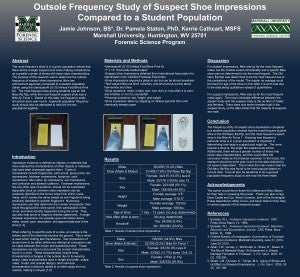Outsole Frequency Study of Suspect Shoe Impressions Compared to a Student Population
Biography:
Jamie Johnson is from Eden Prairie, Minnesota. She graduated from Baylor University in 2009 with a B.S. in forensic science and minors in chemistry and biology. She is a second-year graduate student in the Marshall University Forensic Science Program, completing emphases in crime scene investigation, computer forensics, and forensic chemistry.
Abstract:
The more frequent a shoe is in a given population means that there will be a larger suspect pool when making comparisons, as a greater number of shoes will share class characteristics. The purpose of this research was to determine the outsole frequency of suspect shoe impressions (from law enforcement agencies) compared to a student population (taken using the Identicator® LE-25 Inkless Foot/Shoe Print kit). The most frequent shoe among students was an Old Navy flip-flop, while the most frequent suspect shoe was a Nike Air Force 1. Based on this data, the frequency study should be done year-round. A general population frequency study should also be attempted to help link the two populations together.
Poster:
References:
- Bodziak, W.J. Footwear impression evidence: CRC Press: Boca Raton, FL, 1995.
- Bodziak, W.J. Footwear Impression Evidence: Detection, Recovery and Examination, 2nd ed.: CRC Press: Boca Raton, FL, 1999.
- Federal Bureau of Investigation. Examination of Footwear Impression Evidence. Marshall University, June 21, 2010-June 24, 2010.
- Adair, T.W.; Lemay, J.; McDonald, A.; Shaw, R.; Tewes, R. The Mount Bierstadt Study: An Experiment in Unique Damage Formation in Footwear. J. For. Ident. 2007, 57 (2), 199-205.
- Wyatt, J.M.; Duncan, K.; Trimpe, M.A. Aging of Shoes and its Effect on Shoeprint Impressions. J. For. Ident. 2005, 55 (2), 181-188.
